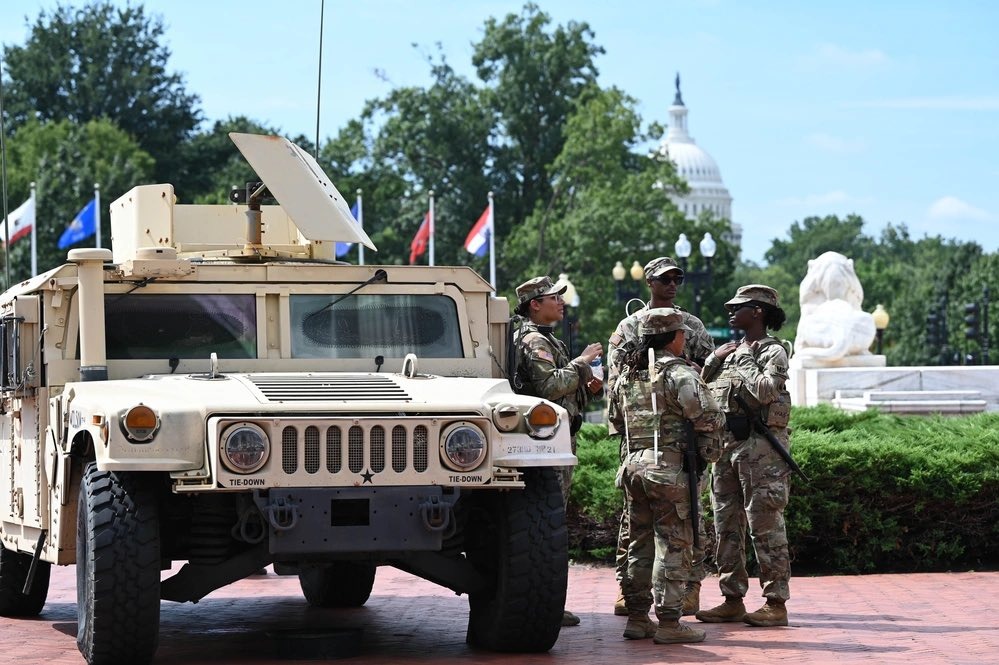On August 11th, President Trump announced the federalization of D.C.’s Metropolitan Police Department (MPD) by invoking Section 740 of the District of Columbia Home Rule Act of 1973.
Citing a “crime emergency” in the nation’s capital, Trump also ordered the deployment of approximately 800 National Guard troops to patrol the city, declaring it “Liberation Day” for D.C.
The executive order, signed alongside a presidential memorandum, places the MPD under the direct control of Attorney General Pam Bondi, with Drug Enforcement Administration chief Terry Cole appointed as interim federal commissioner.
Speaking at a White House press conference, Trump described D.C. as plagued by “violent gangs, bloodthirsty criminals, roving mobs of wild youth, drugged-out maniacs, and homeless people.” He claimed the federal takeover was necessary to “take our capital back.” Trump pointed to high-profile incidents, including the murder of a 21-year-old congressional intern in June and an attempted carjacking of a former Department of Government Efficiency (DOGE) staffer, as justification for his actions.
Section 740 of the Home Rule Act allows the president to assume control of the MPD for federal purposes during “special conditions of an emergency nature.” The takeover is initially limited to 48 hours but can extend to 30 days with congressional notification, which Trump has reportedly provided. Legal analysts warn that permanent control would require congressional repeal of the Home Rule Act, a move likely to face significant Democrat resistance.
D.C. Mayor Muriel Bowser, a Democrat, sharply criticized the move, calling it “unprecedented” and claiming that violent crime in D.C. has dropped to a 30-year low, stating, “Washington, D.C. is a beautiful city… We are at a 30-year low in violent crime.”
Local residents and leaders expressed mixed reactions. A “Free DC” rally near the White House saw activists decry the takeover as an assault on D.C.’s autonomy. “This is not about crime,” one activist said. “This is about silencing dissent.” Conversely, some residents, like Leroy Thorpe of the Citizen Organized Patrol Efforts, supported the move, citing persistent safety concerns. “I think it’s needed,” Thorpe said. “Something has to be done.”
D.C.’s non-voting delegate, Eleanor Holmes Norton, called the action “an egregious assault on D.C. home rule,” arguing that it undermines the self-governance of the city’s 700,000 residents. Norton and Senator Chris Van Hollen plan to reintroduce legislation in September to grant D.C. full control over its police and National Guard. The D.C. Council labeled the takeover a “manufactured intrusion,” while the city’s police union cautiously supported it, calling for temporary intervention to address staffing and legislative issues.
Critics, including Senate Minority Leader Chuck Schumer and Senator Chris Murphy, accused Trump of using the takeover as a distraction from controversies, such as his administration’s handling of Jeffrey Epstein-related documents. Republicans, however, praised the move, with House Speaker Mike Johnson stating, “Every American should be able to visit and enjoy Washington, D.C. without fear.”
The deployment of National Guard troops and additional federal law enforcement, including FBI agents and U.S. Park Police, raises concerns about potential overreach. The American Civil Liberties Union warned that Trump’s actions could foreshadow similar interventions in other cities. Legal challenges are anticipated, with D.C. Attorney General Brian Schwalb calling the move “unlawful.”
As D.C. deals with increased federal presence, the debate over crime, governance, and executive power intensifies. Trump’s actions signal a broader law-and-order agenda, but with local opposition mounting, the future of D.C.’s autonomy hangs in the balance.

